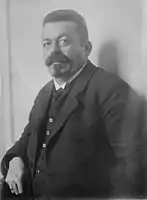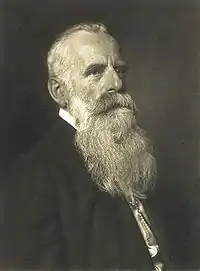1919 German presidential election
The presidential election (Reichspräsidentenwahl) of 1919 was the first election to the office of President of the Reich (Reichspräsident), Germany's head of state during the 1919-1933 Weimar Republic. The constitution that stipulated a direct popular vote was not completed before 11 August 1919. Because a head of state was needed immediately the 1919 presidential election was held indirectly, by the National Assembly, on 11 February 1919. The winner was SPD chairman Friedrich Ebert, who beat former (Imperial) Secretary of the Interior Arthur von Posadowsky-Wehner in the first round of voting by 277 to 49 votes. Ebert was supported by the SPD, the German Centre Party and the German Democratic Party (DDP), the parties of the "Weimar Coalition", which held more than 77 per cent of the seats in the National Assembly. He became President of Germany.
| |||||||||||||||||
| |||||||||||||||||
| |||||||||||||||||
The complete results were as follows:
| 73.1%
277 votes |
12.9%
49 votes |
0.3%
1 vote |
0.3%
1 vote |
13.5%
51 votes |
44 votes | ||||||
| Friedrich
Ebert |
Arthur Graf von
Posadowsky |
Philipp
Scheidemann |
Matthias
Erzberger |
invalid | not voted |
| Candidate (Party) | supported by | votes | percent |
|---|---|---|---|
| Friedrich Ebert (SPD) | SPD, DDP, Zentrum | 277 | 73.1 % |
| Arthur Graf von Posadowsky-Wehner (DNVP) | DNVP | 49 | 12.9 % |
| Philipp Scheidemann (SPD) | - | 1 | 0.3 % |
| Matthias Erzberger (Zentrum) | - | 1 | 0.3 % |
| Delegates eligible to vote | 423 | 100.0 % | |
| cast votes | 379 | 89.6 % | |
| valid votes | 328 | 86.5 % | |
| invalid votes | 51 | 13.5 % |

